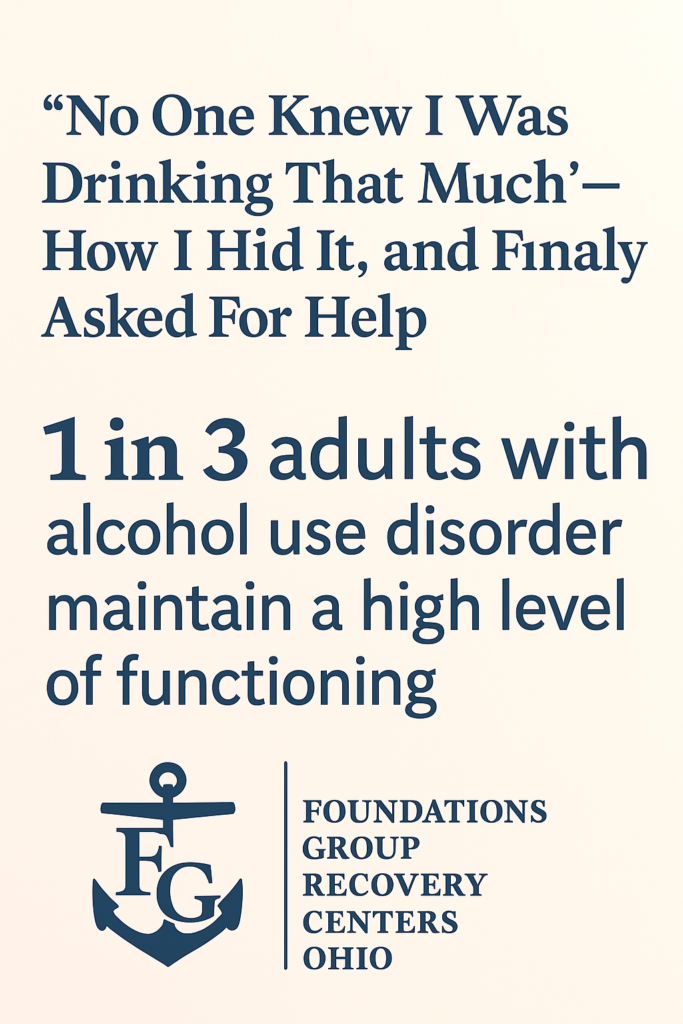I didn’t fit the stereotype of an alcoholic.
No missed shifts. No slurred speeches at dinner parties. No broken bottles or dramatic scenes. I went to work, packed school lunches, responded to emails, and even volunteered once in a while. From the outside, I looked fine—responsible, productive, maybe a little tired.
But underneath? I was unraveling.
The Secret I Was Desperate to Keep
Every evening, once the house was quiet, I would pour my first drink. Then another. Then another. I told myself I deserved it—I’d worked hard, I was holding everything together. Drinking was the reward. The coping mechanism. The way I kept going.
I didn’t drink in the mornings. I didn’t black out. So I convinced myself it wasn’t “that bad.”
But slowly, the lines blurred. I started thinking about alcohol before noon. I counted the hours until I could drink again. I’d sneak an extra bottle into the cart at the store and hide it behind cleaning supplies in the garage.
Still, I told myself I had it under control—because I had to.
The idea that I might actually need help? That felt impossible. Like admitting failure. Like letting go of the only thing that made the stress bearable.
The Moment I Knew I Couldn’t Keep Hiding
There wasn’t one big incident. No dramatic fall from grace. Just a hundred small moments that chipped away at my certainty:
- My daughter asked me why my breath smelled “funny.”
- I started waking up with shaking hands and blaming it on caffeine withdrawal.
- I avoided social events that didn’t involve alcohol, not out of preference—but necessity.
- I caught myself doing mental math to make sure I could drink heavily and still appear normal the next day.
The moment that really shook me? One night I stood in my kitchen and realized I couldn’t remember how many drinks I’d had. I wasn’t even buzzed anymore—just numb. And I felt nothing. No joy, no fear, no comfort. Just empty.
I stared at the sink, still full of dishes, and thought, I can’t keep doing this.
Not “I shouldn’t.” Not “I need to cut back.”
I can’t.
How I Found Foundations Ohio
I didn’t tell anyone at first. I just searched online. Quietly. Anonymously. I landed on Foundations Ohio’s Alcohol Addiction Treatment page and clicked through slowly, afraid that even reading it was admitting too much.
But what I saw didn’t make me feel judged. It made me feel seen.
They didn’t ask for proof I was “bad enough.” They spoke directly to people like me—people who were still functioning, still working, still parenting—but drowning inside.
I called the number on the page. I didn’t know what to say. I just told the truth: “I’m drinking too much. I’m scared to stop.”
That was enough.

What Treatment Looked Like—And What It Gave Me
When I arrived at Foundations Ohio, I was afraid they’d see right through me. That they’d roll their eyes at how “normal” I looked. That they’d say I didn’t belong there.
But what they actually said was: “You’re here. That’s what matters.”
Treatment didn’t ask me to become someone else overnight. It gave me space to let go. To sit with counselors who didn’t treat me like a problem, but like a person who was deeply tired of holding it all in.
In group therapy, I met others like me—nurses, teachers, stay-at-home parents, business owners. We all had different stories, but we shared one truth: we were exhausted from pretending we were okay.
At Foundations, I learned that addiction doesn’t have to look like destruction. Sometimes, it looks like high performance powered by quiet desperation.
And recovery? It looked like rest. Like being honest. Like building a life that didn’t need to be numbed.
Recovery Isn’t About Rock Bottom—It’s About Readiness
There’s a dangerous myth that you have to lose everything before you deserve help. That you have to hit some cinematic low point to qualify for treatment.
That’s not true.
You don’t have to wait until your life falls apart to ask for help. If you’re already feeling the strain—if you’re hiding, struggling, or just scared of what might come next—then now is enough.
Now is a good time to reach out.
Frequently Asked Questions About Alcohol Addiction Treatment
What if I’m still working and caring for my family—do I even need treatment?
Yes. Functioning doesn’t mean thriving. Many people maintain jobs and relationships while battling private alcohol dependence. Treatment is for anyone whose drinking is interfering with their peace, health, or ability to cope without alcohol.
Do I have to go to inpatient rehab?
Not always. Foundations offers multiple levels of care—including outpatient programs—so you can get help while still managing work or family responsibilities. A personalized assessment helps determine what’s right for your needs.
Will people find out I’m in treatment?
Confidentiality is a core part of care. Unless you choose to share your story, no one needs to know. Many professionals and parents seek discreet treatment options that support both privacy and recovery.
What’s different about Foundations Ohio?
Foundations understands that alcohol use doesn’t always look like chaos. They specialize in helping people who are high-functioning but struggling silently. Their approach is compassionate, customized, and focused on long-term healing—not quick fixes.
How do I start?
You don’t need a perfect explanation—just a call. Foundations Ohio will walk you through your options with zero pressure. You can start by speaking to someone who understands at (888) 501-5618.
📞 Ready to take the first step?
Call us at (888) 501-5618. Whether you’re barely holding on or just starting to question your drinking, you deserve to feel whole. Let’s talk about what that could look like—together.
